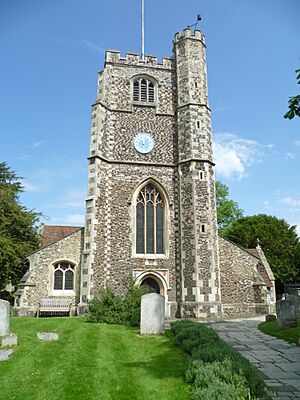Anthony Upton (judge) facts for kids
Anthony Upton (1656-1718) was an English judge who spent much of his working life in Ireland. He was a close friend of the poet William King. Upton was known for being fair, especially during the Islandmagee witch trial in 1711. He was removed from his judge position in 1714 due to political reasons and returned to England, where he passed away in 1718.
Contents
Early Life and Education
Anthony Upton was born in 1656 in Monken Hadley, a place in Middlesex, England. Today, Monken Hadley is part of north London. Not much is known about his family.
He went to Oxford University, first studying at Trinity College and then at All Souls College. He finished his studies in 1674. After university, he joined Lincoln's Inn, which is a place where lawyers train. He became a lawyer, or was called to the Bar, in 1683.
Life in Ireland and Friendship
In 1702, Upton became a judge in Ireland for the Court of Common Pleas (Ireland). This court handled common legal cases. He bought a nice house called Mountown, near what is now Monkstown, County Dublin. This house used to belong to the famous writer Sir Richard Steele.
Upton was good friends with the poet William King. King even lived at Mountown for a while. While staying there, King wrote one of his well-known poems, Mully of Mountown, which was a funny poem about a red cow. Both Upton and King loved poetry and enjoyed country life.
Some people who didn't like Upton politically said he spent too much time at Mountown with his friend and not enough time on his judge duties. William King also held important government jobs. It was said that both friends "thought of nothing but spending their last years in their rural retreat." However, King went back to England in 1708 and died there in 1712.
It's worth noting that Upton wasn't the only judge accused of not always being at work. His fellow judge, Sir Gilbert Dolben, 1st Baronet, also spent part of every year in England, even though he was a judge in Ireland.
The Islandmagee Witch Trial
Anthony Upton showed he was a fair and caring judge during the Islandmagee witch trial in 1711. These trials were the last known witchcraft trials in Ireland. They started because of a disagreement between two groups of Protestant people.
Eight women were accused of using magic to harm a young woman named Mary Dunbar. The accused women were Janet Mean, Janet Latimer, Janet Miller, Margaret Mitchell, Catherine McCalmond, Janet Liston, Elizabeth Seller, and Janet Carson.
When Upton spoke to the jury (the group of people who decide if someone is guilty), he didn't say that witchcraft wasn't real. That would have been a very unusual idea for his time. Instead, he talked about how good the accused women's characters were. Witches were believed to stop going to church. Upton pointed out that these women regularly attended church, which showed they were innocent. He also said that Mary Dunbar's evidence was just "visionary imaginings," meaning she might have imagined things.
Upton told the jury that they "could not bring the accused in guilty upon such evidence." This meant he thought there wasn't enough proof to convict them.
Sadly for the accused women, another judge, James Macartney, told the jury to find them guilty. The jury followed Macartney's advice. Witchcraft could lead to a death sentence back then. However, the women were sentenced to one year in prison and four times in the pillory. The pillory was a wooden frame where people's heads and hands were locked, often in public, as punishment. It is said that the women were treated very roughly by an angry crowd while in the pillory. Even so, Upton's fair attitude might have helped make sure there were no more witch trials in Ireland after this one.
Later Life and Death
When Queen Anne died in 1714, many judges in Ireland, including Upton, lost their jobs. This was often due to political changes. Most of these judges didn't suffer lasting harm to their careers.
However, Upton might have felt this disgrace more deeply than others. He left his beloved home at Mountown and went back to England. He started working as a lawyer again. In 1718, he became ill and passed away.
 | James B. Knighten |
 | Azellia White |
 | Willa Brown |


